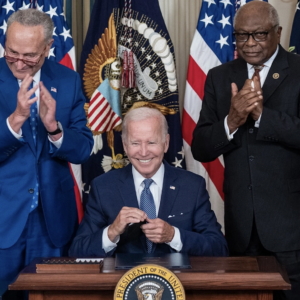NBC News released a new poll on Sunday that found 74 percent of Americans believe the country is on the wrong track — the highest number in the history of its survey.
It also found that, while President Joe Biden’s approval had ticked up to 42 percent, his disapproval had also increased to 55 percent. Not a great number for Democrats just 80 days ahead of the midterms.
National pundits say the recent legislative achievements of Biden and the Democratic majority will help turn things around for the party. They plan to spend $10 million marketing their most recent legislation, the $739 billion …. Something Act.
When Sen. Joe Manchin and Majority Leader Sen. Chuck Schumer revealed the legislative deal they’d negotiated in secret, they called it the “Inflation Reduction Act.” But when NBC News’ pollsters asked voters about it last week, here’s the language they used:
“Democrats recently passed legislation supported by President Joe Biden that addresses health care and prescription drug prices, climate change, taxes for corporations, and the federal budget deficit. Do you think it was a good idea or a bad idea?”
Notice what words are missing: “Inflation” and “reduction.”
It’s not just NBC. The New York Times’ coverage featured the headline, “What’s in the Climate, Tax and Health Care Package?” At NHPR it was “Biden Signs Sweeping Climate, Health Care, Tax Bill Into Law.” The Concord Monitor had a similar headline: “Biden Signs Massive Climate and Health Care Legislation.”
Inflation? Barely a mention, other than to note that independent analysts like the Congressional Budget Office and the Wharton School say the new law won’t have a significant impact.
As Kiplinger reports, “Despite its name, the Inflation Reduction Act’s main goals are really to address climate change and lower healthcare costs.”
That was a very different message from the one Sen. Maggie Hassan and other supporters of the bill were preaching just weeks ago. “I am encouraged by the agreement on the Inflation Reduction Act, which will fight inflation, pay down the deficit, make prescription drugs cheaper, and lower energy costs,” Hassan tweeted on July 28.
An August 6 Hassan op-ed for the Portsmouth Herald was headlined: “Inflation Reduction Act lowers drug costs, fights inflation, reduces the deficit.”
Now that the bill has passed, Hassan has dropped the claims of “inflation fighting,” instead claiming that subsidies for buying electric vehicles and heat pumps will eventually lower individual families’ energy bills and so, for them, it is lower inflation.
Except it is not. Spending nearly $400 billion tax dollars on rebates for weather-stripping a home or buying energy-efficient appliances may eventually save some individuals money (they still have to buy the EV or washing machine up front). But creating more customers for fewer goods is likely to create more upward price pressure for the economy as a whole, experts say.
As InsideEVs reported in June, the average cost of an electric vehicle had already risen to $54,000 before the Act Formerly Known As ‘Inflation Reduction’ passed Congress. That was due in part to supply chain issues and shortages in inventory, something that is not likely to change in the next year. And, they added, “soaring demand is almost certain to push prices up as well.”
Supporters of the $739 billion law like Hassan and Rep. Chris Pappas have also shifted the conversation toward the law’s health care provisions. For example, Obamacare subsidies were “temporarily” granted to families earning up to $300,000 a year. Those subsidies have been extended for another three years, at a cost of around $25 billion per year.
That is another $25 billion in federal dollars going into an economy that is already at 8.5 percent inflation. Another great deal for the six-figure-salary families who get the free money, but how will that lower price pressure overall?
The question facing Democrats is how voters will react to the law once they learn the details. The early indicators aren’t good. The NBC News poll asked what impact voters believed the new law, whatever it is called, will have on them personally.
Just 26 percent said it would make things better; 35 percent said it would make things worse.





